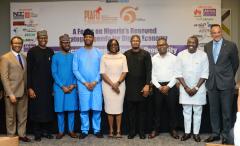Telecom
Rewane, Financial Expert Backs Telcos’ Move to Hike Tariff
Bismarck Rewane, managing director/chief executive officer, Financial Derivatives Company Limited has backed telecommunication companies’ move to increase tariffs.

Recall that telecom companies recently reiterated calls for an increase in prices of calls, data, and other services.
They argue that current prices are insufficient to maintain their business operations.
This request is contained in a communique signed by the Association of Licensed Telecom Operators of Nigeria (ALTON) and the Association of Telecommunication Companies of Nigeria (ATCON).
The telecom providers are advocating for cost-reflective tariffs, claiming that adverse economic headwinds are threatening their financial viability.
The operators stated that its general service pricing framework has not been reviewed upward in the last 11 years because of regulatory constraints.
“For a fully liberalised and deregulated sector, the current price control mechanism, which is not aligned with economic realities, threatens the industry’s sustainability and can erode investors’ confidence,” the telcos said.
The telcos called on the government to facilitate a constructive dialogue with its industry stakeholders to address pricing challenges and establish a framework that balances consumers’ affordability with their financial viability.
This push for higher prices coincides with MTN Nigeria reporting a loss due to foreign exchange losses in 2023 and Airtel experiencing declining profits amid an economic downturn in the country.
While the development has triggered a backlash in some quarters, Rewane said telco pricing needs to reflect current realities.
He was a guest on weekend’s edition of Channels Television’s Politics Today
Telecom
Glo 1 Reaches 8-year Milestone of Continuous Connectivity
Glo 1, the international submarine cable wholly owned and operated by digital and telecom services company, Globacom, has marked eight years of uninterrupted connectivity, from 2016 to date.

Throughout this period, it has maintained an excellent record in the provision of internet access for both customers in Nigeria and across Africa. It lived up to expectations in March, this year during the widespread internet disruptions as result of cuts to other submarine cables in Nigeria and West Africa.
Glo 1 was functioning all through, providing normal operations to financial institutions, internet service providers, and data consumers.
The resilience of the facility has been attributed to its robust construction and durability by industry experts.
To further enhance its capabilities, Globacom has upgraded the Glo 1 submarine fiber cable infrastructure, optimizing its utilization and service delivery, leading to provision of direct, low-latency connectivity to London and ensuring ultra-fast and reliable internet access.
The upgrade further complements Globacom’s continuous network expansions and upgrades, targeted at ensuring customers’ unique calling and browsing experiences.
Reiterating the capacity of Glo 1 to provide tailored solutions to meet the diverse needs of various clients across different sectors of the economy, including oil and gas, manufacturers, government institutions, educational establishments, and medical facilities, Globacom explained that the cable supports key applications such as teleconferencing, distance learning, disaster recovery, and telemedicine, benefitting communities across Africa.
Globacom has sole ownership of the entire Glo 1 infrastructure, spanning access systems, national fiber-optic backbone, international gateways, international cable networks, and data center services. The comprehensive ownership enables Globacom to offer Glo 1 clients a unique advantage through last-mile and domestic long-haul services, as well as wide presence and fiber-optic networks.
Telecom
Airtel Africa’s Revenue Drops 16%, Records $7M Net Profit in Q1 of 2025
Airtel Africa has reported a consolidated net profit of $ 7 million for the first quarter of its 2025 financial year ending June 2024 against a $ 170 million loss in the year-ago period.

Its net profit was primarily impacted by the $ 80 million of exceptional derivative and foreign exchange losses (net of tax) and lower Ebitda due to significant currency devaluation across key markets, Airtel Africa said.
It had reported a loss of $ 91 million for the fourth quarter ended March 2024 on account of tax impact and forex loss.
“Strong fundamentals and focussed execution continue to support operating performance despite challenging macro-economic environment,” the company, which operates in 14 African countries, said.
The company’s consolidated revenue fell 16 per cent in Q1 FY25 to $ 1,156 million from $ 1,377 million a year ago.
The decline in revenue reflects the impact of currency devaluation, particularly in Nigeria, the company said.
“We have initiated a comprehensive cost optimisation programme across the Group. We have already seen success in this project, with savings arising in network and distribution costs, and continued opportunities as contract renegotiations continue. We expect sustainable savings to continue as the year progresses,” said Airtel Africa CEO Sunil Taldar.
Airtel Africa has fully repaid the outstanding debt due at the HoldCo during Q1, he said, adding that the company is trying to further reduce foreign currency exposure to limit the impact of currency devaluation on the business.
“The growth opportunity across our markets remains compelling, and we continue to focus on margin improvement as indicated in our FY24 results,” Taldar said.
The company’s Ebitda margins tanked to 45.3 per cent from 49.5 per cent in the year-ago period.
“Reported currency trends were clearly impacted by the FX headwinds across some of our markets, particularly in Nigeria and Malawi. This contributed to a reported Group revenue and Ebitda decline of 16.1 per cent and 23.3 per cent, respectively, in Q125,” the company said.
Its total customer base grew by 8.6 per cent to 155.4 million.
“Data customer penetration continues to rise, driving a 13.4 per cent increase in data customers to 64.4 million. Data usage per customer increased by 25.1 per cent to 6.2 GBs, with smartphone penetration increasing 4.7 per cent to reach 41.7 per cent,” the company said.
Telecom
ITU Ranks Nigeria High in Digital Transformation Readiness
A new report of the International Telecommunications Union (ITU) has ranked Nigeria very high at 71 per cent, in comparative legal, policy and governance frameworks towards G5 – advanced state of readiness for digital transformation known as G5 with Germany, Finland and Singapore leading the global chart.

In the report conducted by the ITU, the United Kingdom’s Foreign, Commonwealth & Development Office (FCDO) and the Nigerian Communications Commission (NCC), and unveiled by Nigeria’s Minister of Communications, Innovation and Digital Economy, Dr. Bosun Tijani in Abuja on Monday, Nigeria was ranked among Africa’s top seven BEMECS 5G Readiness Index, which represents the country’s readiness to deploy and adopt mass-market 5G networks.
Titled, Collaborative Regulation: Accelerating Nigeria’s Digital Transformation, and presented at the Digital Economy Complex, Mbora, Abuja by ITU’s Kagwira Nkonge, the report, among other things, presented a case study for ‘collaborative regulation review to assess and support Nigeria’s transition towards collaborative digital governance, evidence-based policy making and agile regulation in the digital economy”.
The report, which was presented to a cross section of key industry stakeholders including service providers, government agencies, representatives of multilateral institutions, West Africa Telecommunications Regulators Assembly (WATRA), Africa Telecommunications Union (ATU), among others, was also designed to complement existing cross-country benchmarks in which features of countries policy and regulatory environment are assessed.
The features of countries policy and regulatory environment are assessed according to the pillars of the Generations of Regulation frameworks which tracks telecom regulatory maturity towards digital transformation readiness, designated at G5 Advanced State of Readiness”, and for which Nigeria currently stands at G4.
Advanced State of Readiness is benchmarked against four critical levels of accomplishments which include national collaborative governance, policy design principles, digital development toolbox, digital economic policy agenda, with Nigeria scoring 91 per cent in regulatory capacity; 82 per cent in Market Rules; 81 per cent.
For further inquiries: Director Public Affairs Department, Nigerian Communications Commission Plot 423 Aguiyi-Ironsi Street, Maitama, Abuja email: [email protected] Tel: +234-90204617325, +234-8051110337 in Collaborative Governance; 76 per cent in Legal Instruments for ICT/Telecom markets; 69 per cent in National Digital Agenda Policy, among other benchmarks.
Dr. Tijani, in his remarks at the event, commended the ITU and partner agencies and consultants that actualised the report; and expressed Federal Government’s commitment “to utilise this report as a navigational aid towards attainment of our regulatory objectives and policies outlines towards achieving a robust digital
economy”.
“That is what we will continue to do as a government, ensuring that we can put ourselves in a place to have cutting-edge modern regulations in place to ensure that business is done properly in our sector and to ensure that, where possible, increase the local content of the sector as well,” he said.
Dr. Tijani noted that NCC has adapted over the years in response to how its role and mandate have changed. He explained, “Fifteen, twenty years ago, NCC was just regulating the telecommunications sector, today, NCC regulates the foundation for which any economy would be prosperous.”
The Executive Vice Chairman of the Nigerian Communications Commission, Dr. Aminu Maida, who hosted the presentation, welcomed the indicators that promote effective regulation, attraction of greater investment, and development of innovative models for broader digital inclusion.
He emphasised that collaborative regulation would support Nigeria’s transition towards effective digital governance, evidence-based policy making and agile regulation in the nation’s digital economy.

 News2 days ago
News2 days agoUniversity Don Urges Stricter Copyright Enforcement to Combat Music Piracy

 News1 day ago
News1 day agoOsun, Delta Fine Google, Meta $350m Each for Alleged Tax Evasion

 Telecom2 days ago
Telecom2 days agoKuda partners with SeerBit for safe and quick cardless payments online

 Telecom2 days ago
Telecom2 days agoNigerian Fintech Firm Risevest Set to Acquire Kenyan Stock-trading App Hisa

 Telecom2 days ago
Telecom2 days agoNetflix Jacks Up Subscription Price By 40% in Nigeria

 Telecom2 days ago
Telecom2 days agoMTN Nigeria Launches First Fully Digitised Retail Store in Sub-Saharan Africa

 Telecom2 days ago
Telecom2 days agoMercury Bank Blocks Accounts Linked to Nigerian Startups, Others

 Broadcasting2 days ago
Broadcasting2 days agoNCC Promotes Copyright Awareness among Printers, Creatives





























